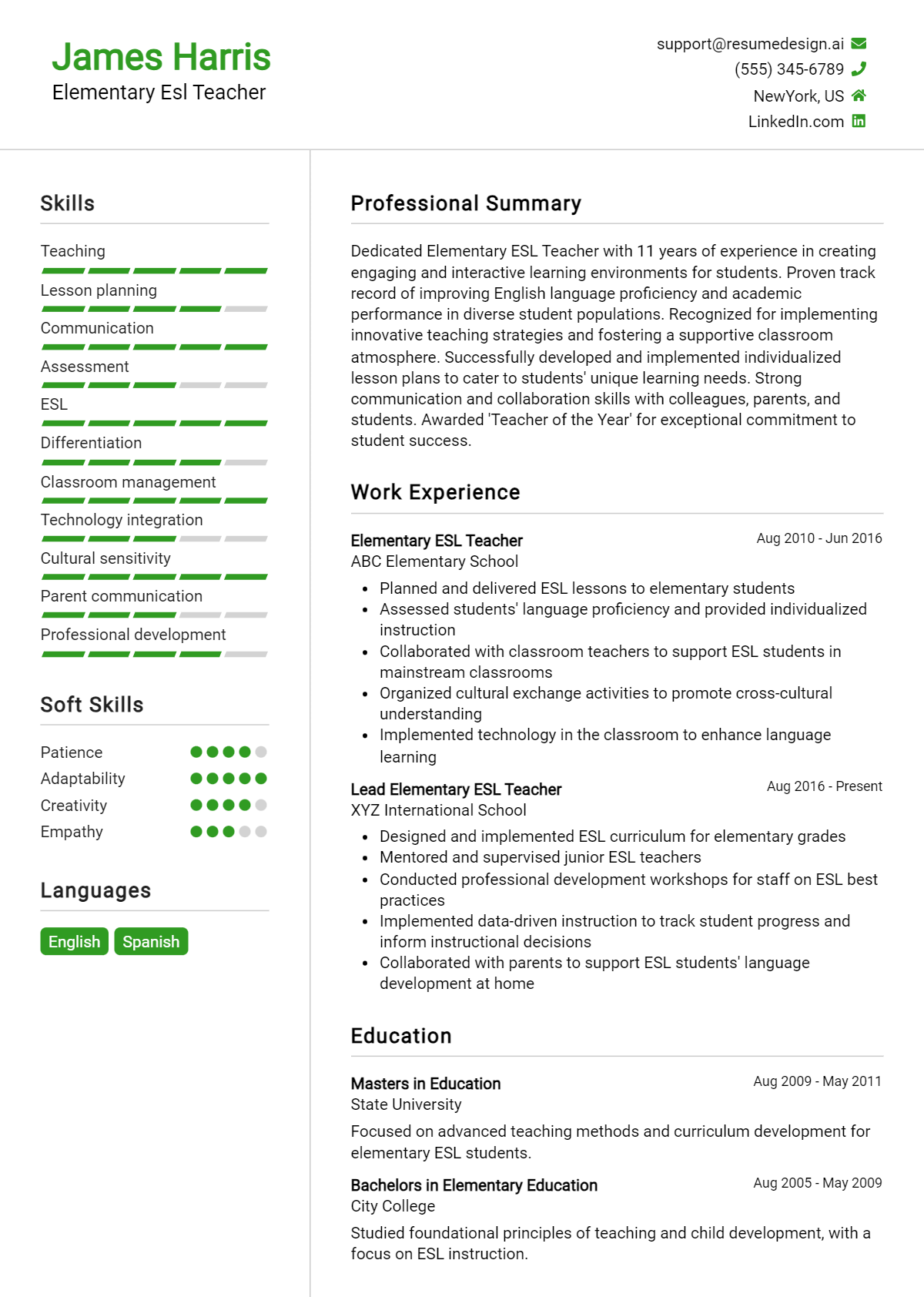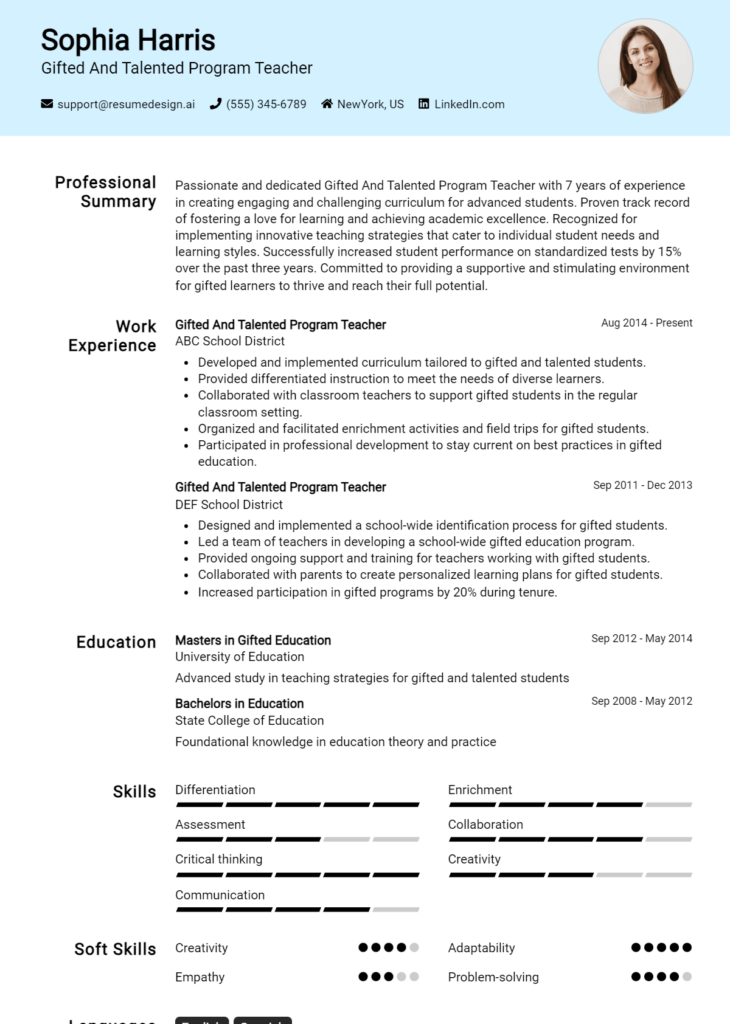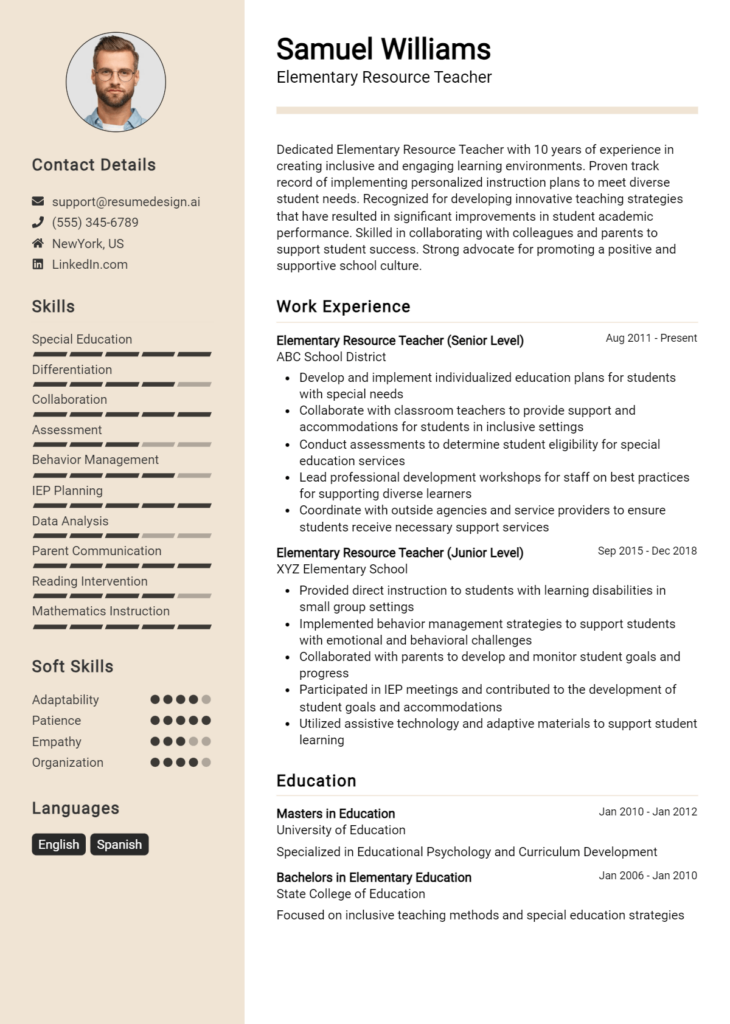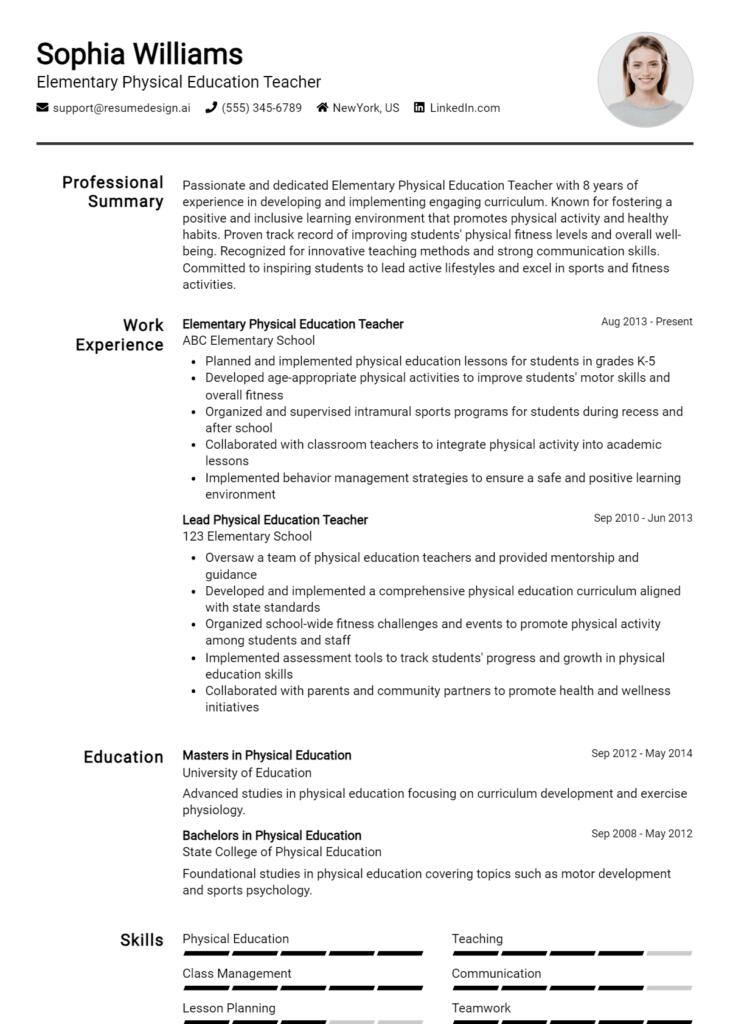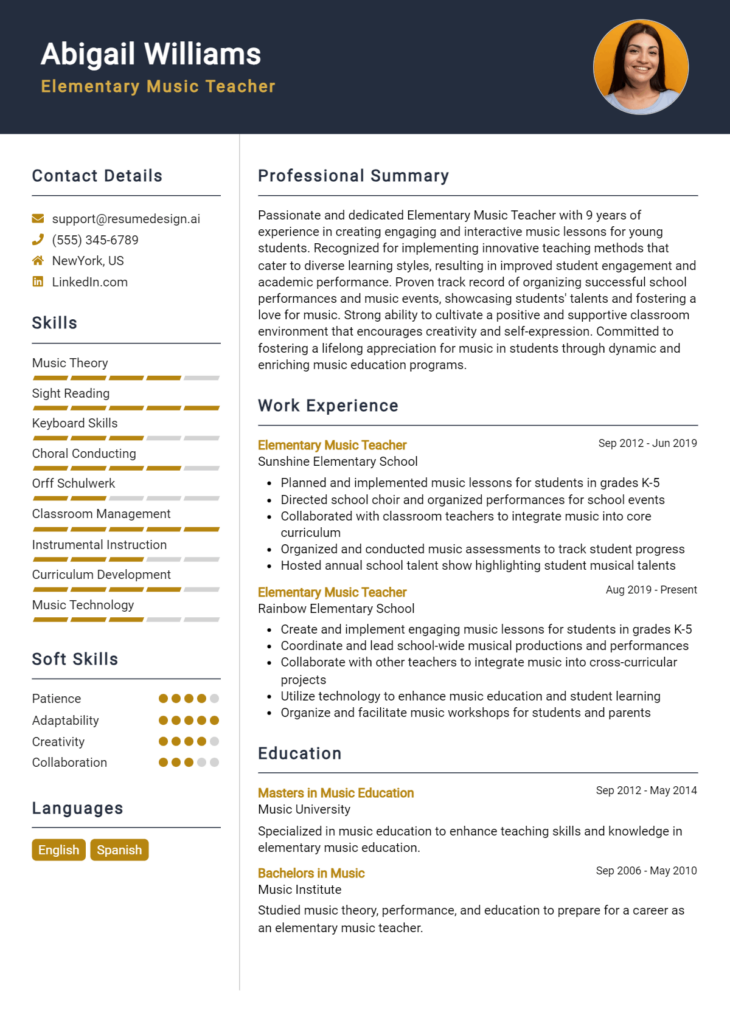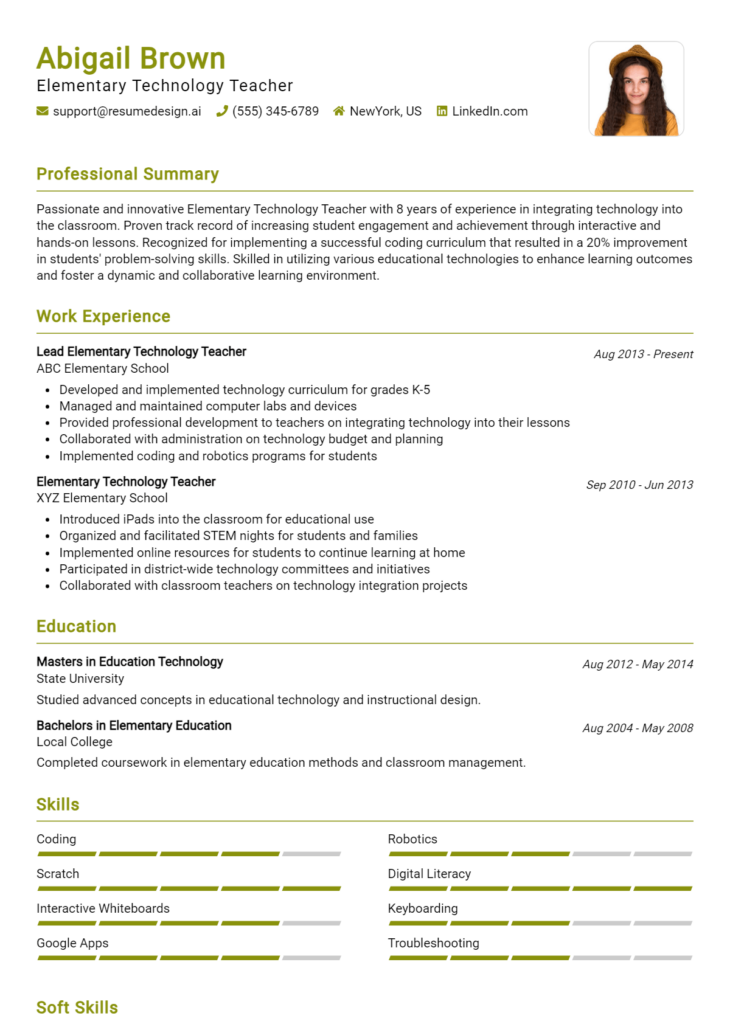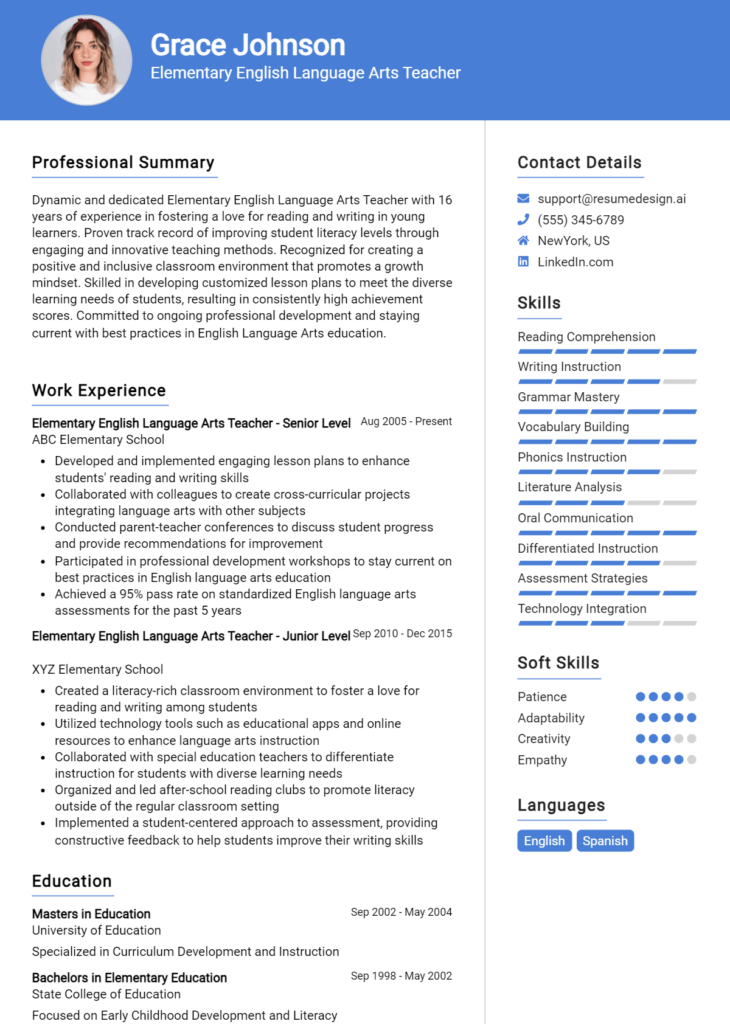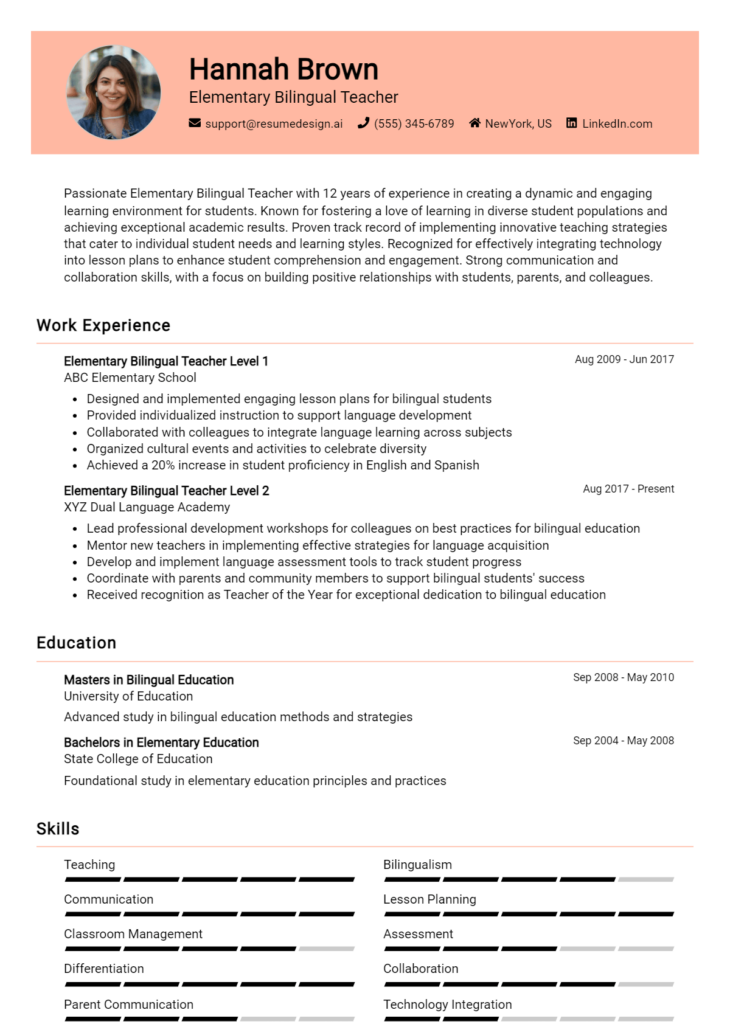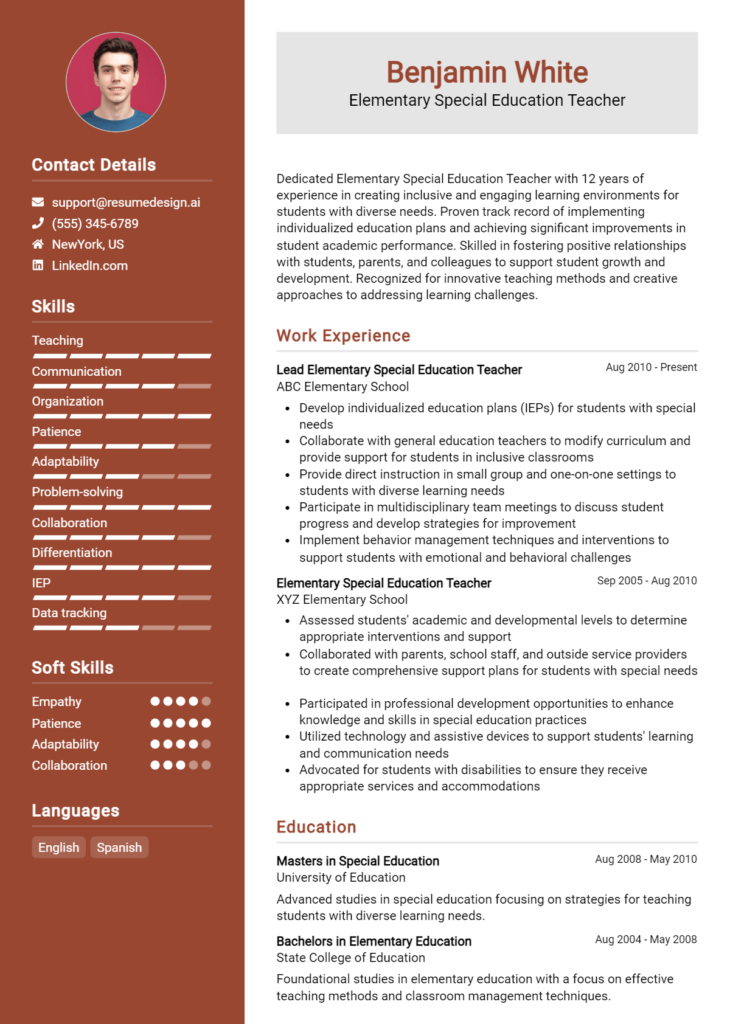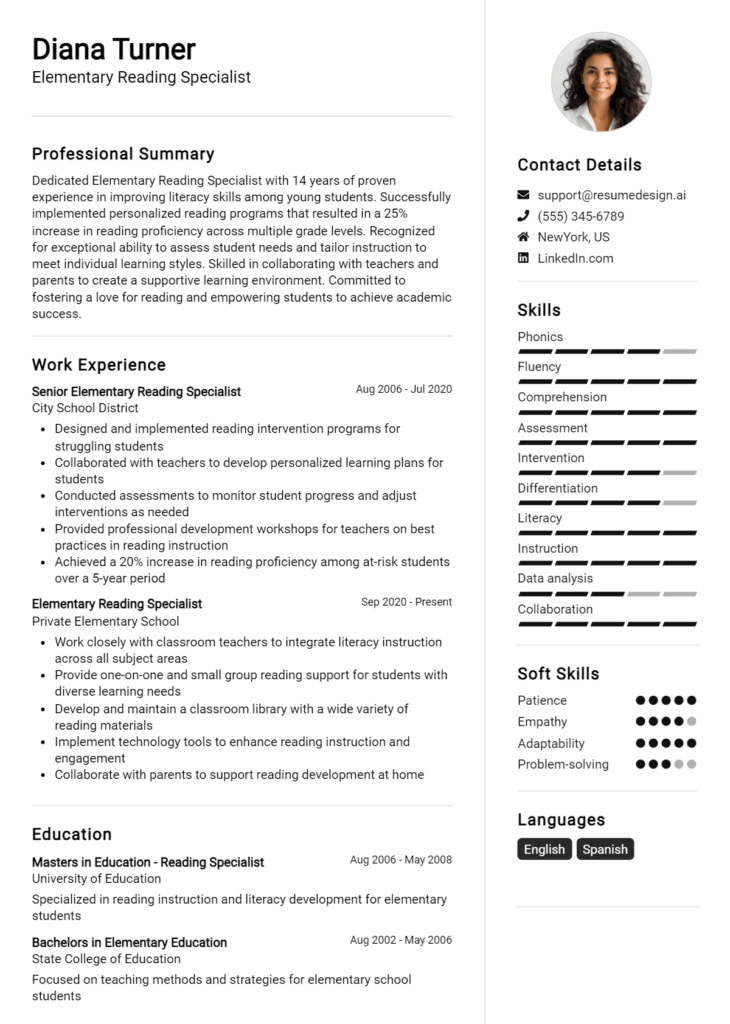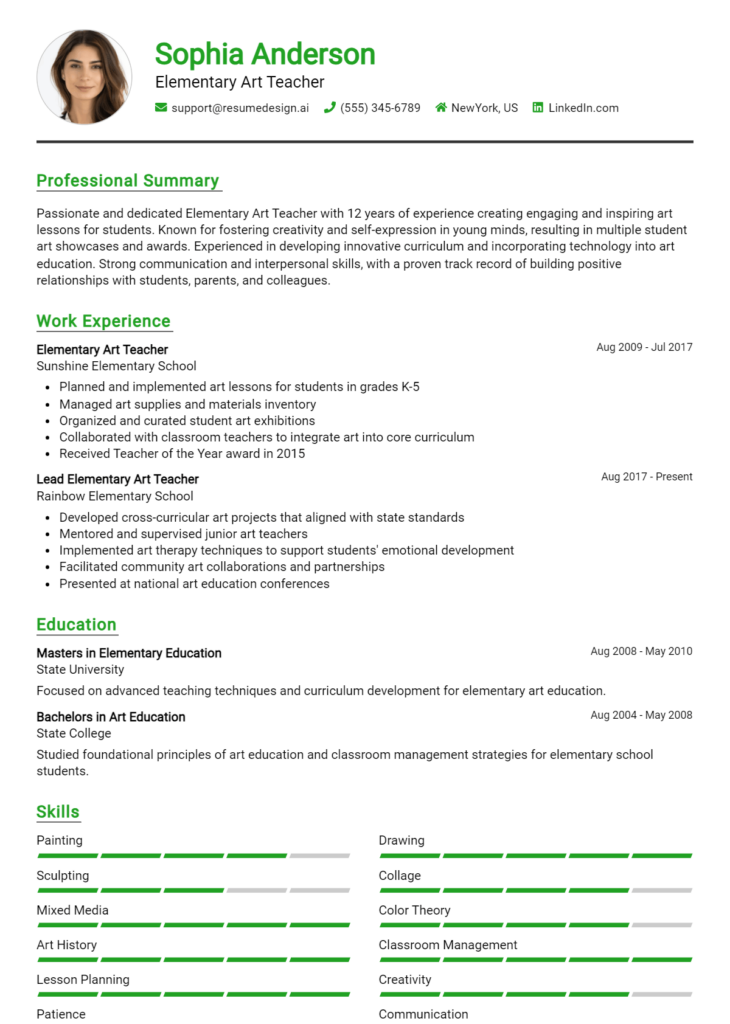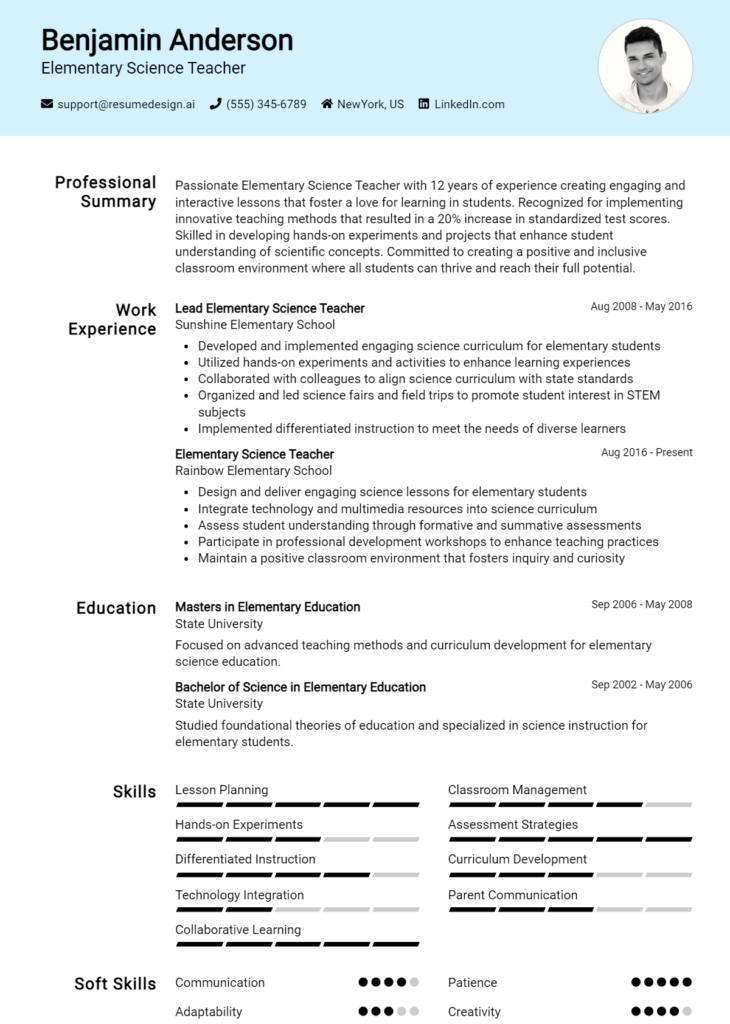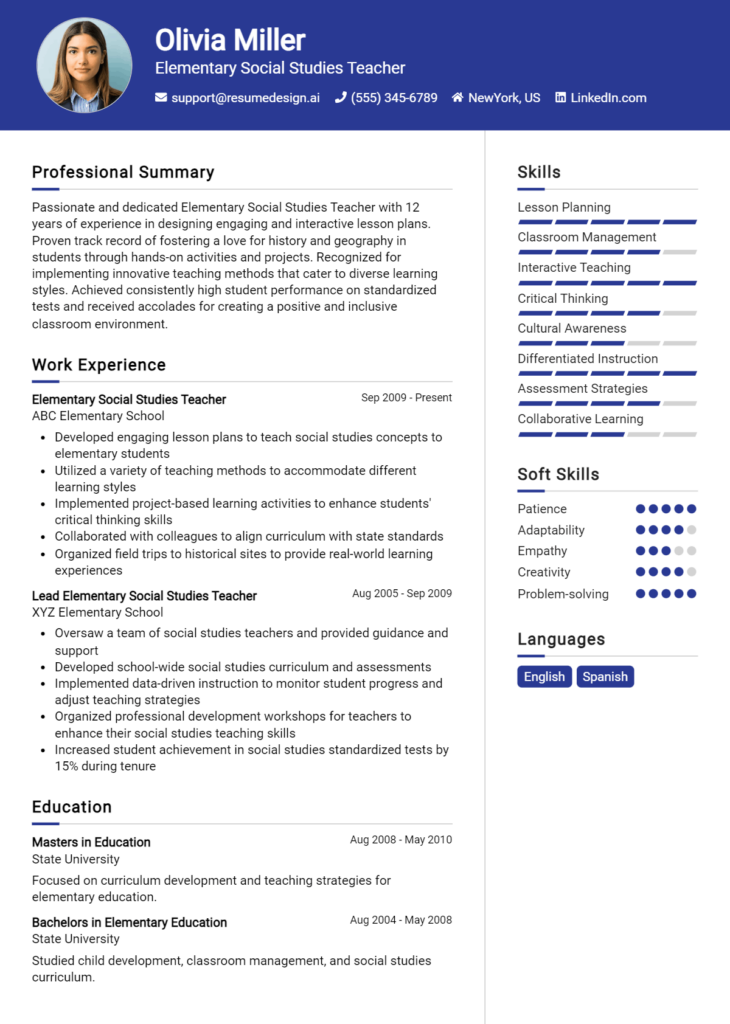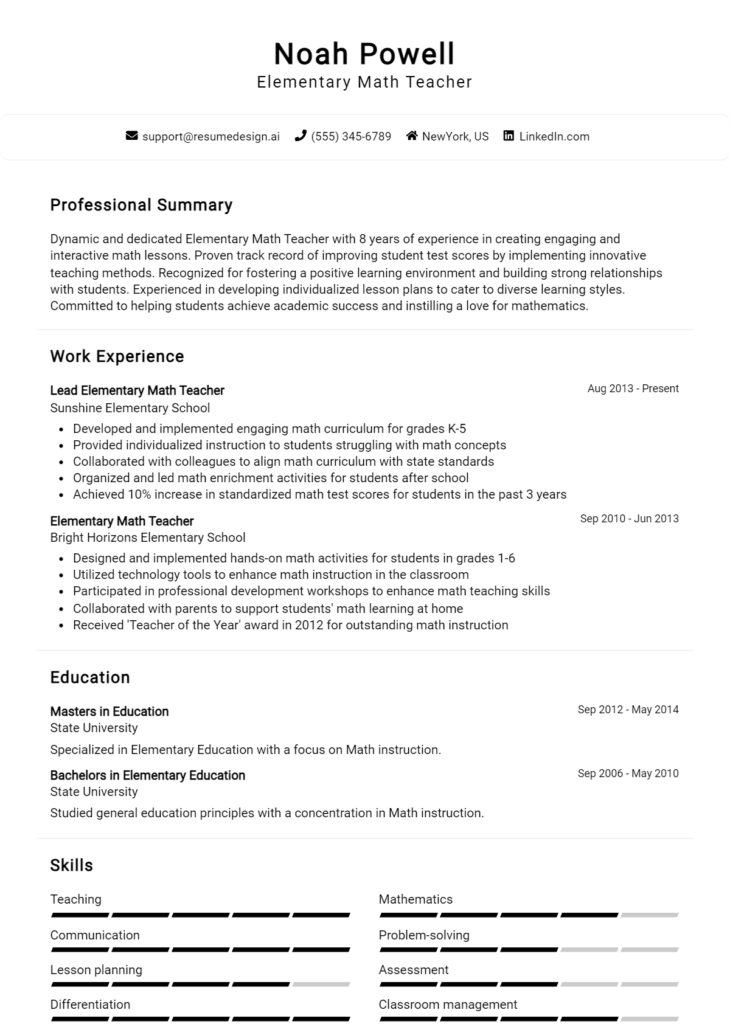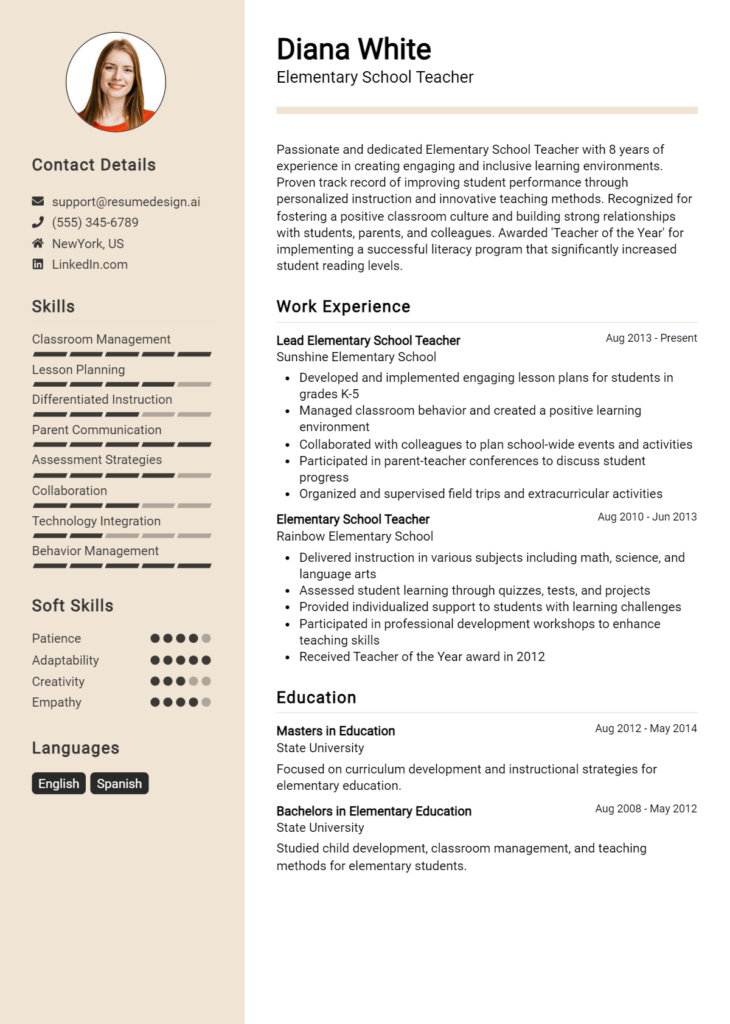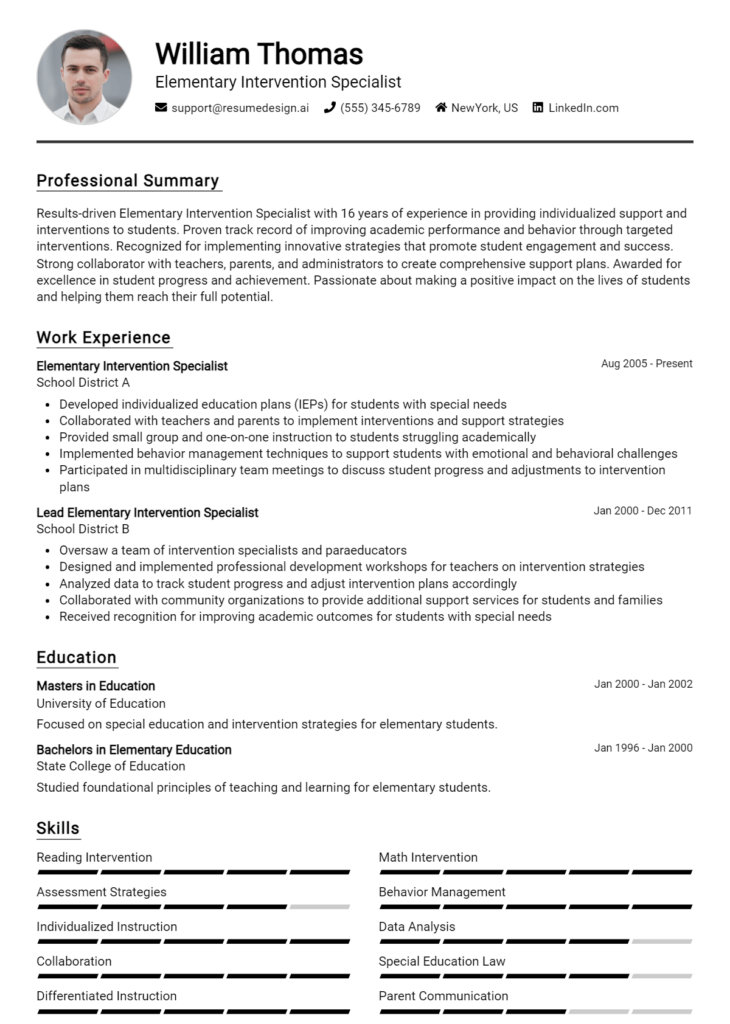Elementary ESL Teacher Core Responsibilities
An Elementary ESL Teacher plays a crucial role in fostering language development among young learners, bridging the gap between various educational departments, such as language arts and special education. Key responsibilities include designing engaging lesson plans, assessing student progress, and collaborating with parents and staff. Strong technical, operational, and problem-solving skills are essential for adapting teaching methods to meet diverse needs. These competencies contribute significantly to organizational goals, and a well-structured resume can effectively highlight these qualifications to potential employers.
Common Responsibilities Listed on Elementary ESL Teacher Resume
- Develop and implement engaging ESL lesson plans tailored to student needs.
- Assess and monitor student progress through regular evaluations.
- Create a positive and inclusive classroom environment.
- Collaborate with classroom teachers to integrate ESL strategies.
- Provide individualized support to students facing language barriers.
- Communicate regularly with parents regarding student progress.
- Utilize technology and resources to enhance language learning.
- Participate in professional development workshops and training.
- Adapt lessons to accommodate various learning styles and abilities.
- Encourage cultural exchange and understanding among students.
- Maintain accurate records of student performance and attendance.
- Foster a love for language and learning in students.
High-Level Resume Tips for Elementary ESL Teacher Professionals
In today's competitive job market, a well-crafted resume is essential for Elementary ESL Teacher professionals seeking to make a lasting impression on potential employers. As the first point of contact between candidates and hiring managers, a resume must effectively showcase not only the candidate's skills and educational background but also their unique achievements and contributions to the field. An impactful resume can set the stage for a successful interview and ultimately lead to a fulfilling teaching position. This guide aims to provide practical and actionable resume tips specifically tailored for Elementary ESL Teacher professionals, ensuring that your application stands out in a crowded field.
Top Resume Tips for Elementary ESL Teacher Professionals
- Tailor your resume to the specific job description by incorporating keywords and phrases used in the posting.
- Highlight relevant teaching experience, including internships, volunteer work, and any specialized ESL training.
- Quantify your achievements where possible, such as the number of students taught or improvements in student language proficiency.
- Showcase industry-specific skills, such as lesson planning, classroom management, and cultural sensitivity.
- Include certifications related to ESL teaching, such as TESOL, TEFL, or other relevant qualifications.
- Utilize a clear and organized format that enhances readability, making it easy for hiring managers to navigate your qualifications.
- Incorporate a professional summary at the top that succinctly captures your teaching philosophy and strengths.
- List professional development activities, workshops, and conferences attended that demonstrate your commitment to continuous learning.
- Add any technology skills, especially those related to online teaching tools and platforms, as they are increasingly relevant in today’s educational landscape.
By implementing these tailored resume tips, Elementary ESL Teacher professionals can significantly increase their chances of landing a job in the field. A well-structured and thoughtfully crafted resume not only highlights your qualifications but also conveys your passion for teaching and your commitment to fostering language development in young learners. With the right approach, you can make a powerful first impression that resonates with hiring committees and sets the foundation for a successful career in ESL education.
Why Resume Headlines & Titles are Important for Elementary ESL Teacher
In the competitive field of education, especially for Elementary ESL Teachers, a well-crafted resume headline or title is crucial for standing out among numerous applicants. A strong headline grabs the attention of hiring managers and serves as a concise summary of a candidate's key qualifications, expertise, and teaching philosophy. It should be both relevant and directly related to the position being applied for, allowing hiring managers to quickly assess the applicant's potential fit for their school. An impactful headline not only highlights the candidate's strengths but also sets the tone for the rest of the resume, making it an essential element in the job application process.
Best Practices for Crafting Resume Headlines for Elementary ESL Teacher
- Keep it concise—limit to one or two impactful phrases.
- Make it role-specific—include the job title you are applying for.
- Highlight key strengths—focus on skills or experiences relevant to ESL teaching.
- Use action words—employ dynamic verbs to convey enthusiasm and expertise.
- Incorporate quantifiable achievements—if applicable, use numbers to illustrate success.
- Tailor it for each application—customize your headline to fit the specific job description.
- Avoid jargon—ensure clarity by using straightforward language.
- Make it compelling—create a sense of urgency or excitement about your candidacy.
Example Resume Headlines for Elementary ESL Teacher
Strong Resume Headlines
Dynamic Elementary ESL Teacher with 5+ Years of Experience in Bilingual Education
Passionate ESL Educator Committed to Fostering Inclusive Learning Environments
Innovative Elementary ESL Teacher Specializing in Engaging Curriculum Development
Results-Driven ESL Instructor with Proven Track Record in Student Achievement
Weak Resume Headlines
Teacher Looking for Work
ESL Teacher with Experience
The strong headlines listed above are effective because they immediately convey specific qualifications and a commitment to the field of ESL education, showcasing the candidate's experience and unique strengths. In contrast, the weak headlines fail to impress due to their vagueness and lack of specificity, making it difficult for hiring managers to gauge the candidate's suitability for the position. By avoiding generic phrases and instead focusing on concrete achievements and skills, candidates can create a more compelling and memorable impression.
Writing an Exceptional Elementary ESL Teacher Resume Summary
A well-crafted resume summary is crucial for an Elementary ESL Teacher, as it serves as the first impression to hiring managers. This brief introduction not only highlights a candidate’s key skills, experience, and accomplishments pertinent to the role but also sets the tone for the rest of the resume. A strong summary can quickly grab attention, making it easier for employers to see the potential value a teacher can bring to their students and school community. It should be concise, impactful, and meticulously tailored to align with the specific job requirements, ensuring that it resonates with the hiring team.
Best Practices for Writing a Elementary ESL Teacher Resume Summary
- Quantify Achievements: Use specific numbers or metrics to demonstrate your impact, such as student improvement percentages or the number of students taught.
- Focus on Relevant Skills: Highlight skills that are directly applicable to the ESL teaching role, such as lesson planning, classroom management, and cultural sensitivity.
- Tailor the Summary: Customize your summary for each application to reflect the specific job description and requirements.
- Showcase Teaching Experience: Briefly mention years of experience and relevant teaching environments, such as international settings or diverse classrooms.
- Use Action Verbs: Start sentences with strong action verbs to convey enthusiasm and proactivity, such as “developed,” “implemented,” or “enhanced.”
- Maintain Clarity and Conciseness: Keep the summary to 3-5 sentences, ensuring every word adds value and relevance.
- Highlight Language Proficiency: Mention any additional languages spoken, especially if they are relevant to the student demographic.
- Include Professional Development: Reference any certifications or ongoing training that enhance your qualifications as an ESL teacher.
Example Elementary ESL Teacher Resume Summaries
Strong Resume Summaries
Dynamic and dedicated ESL Teacher with over 5 years of experience in nurturing diverse classrooms and improving student language proficiency by an average of 30%. Proficient in developing engaging lesson plans that cater to different learning styles and cultural backgrounds.
Compassionate educator with a proven track record of fostering a positive learning environment for over 150 students in a multicultural setting. Successfully implemented innovative teaching strategies, resulting in a 25% increase in student engagement and participation.
Results-oriented ESL Teacher with 7 years of experience in both public and private schools. Skilled in utilizing technology to enhance language acquisition, leading to a 40% improvement in student test scores in a year.
Weak Resume Summaries
Experienced teacher looking for a position in ESL education. I have taught many students and enjoy working with kids.
Dedicated ESL Teacher seeking to apply my skills in a new environment. I am passionate about teaching and helping students learn English.
The examples of strong resume summaries stand out because they include specific achievements, quantify results, and demonstrate direct relevance to the ESL teaching role. They provide concrete evidence of the candidate’s effectiveness and skills. In contrast, the weak resume summaries lack specificity, do not highlight measurable outcomes, and read as generic statements that fail to convey the candidate’s unique qualifications or contributions to the educational environment.
Work Experience Section for Elementary ESL Teacher Resume
The work experience section of an Elementary ESL Teacher resume is crucial in showcasing a candidate's technical skills, classroom management abilities, and capacity to deliver high-quality educational experiences to students. This section serves as a platform for candidates to demonstrate their hands-on experience in teaching English as a second language, highlighting their effectiveness in lesson planning, student engagement, and assessment strategies. By quantifying achievements and aligning their experiences with industry standards, candidates can effectively illustrate their impact within the educational environment, making a compelling case for their candidacy.
Best Practices for Elementary ESL Teacher Work Experience
- Highlight specific ESL teaching methodologies used in the classroom.
- Quantify student progress through standardized test scores or other metrics.
- Focus on collaborative efforts with parents and staff to enhance student learning.
- Detail experience with diverse student populations and differentiated instruction.
- Include any leadership roles or contributions to curriculum development.
- Use action verbs to convey a sense of initiative and impact.
- Be specific about the tools and technologies used in teaching.
- Align experiences with current ESL teaching standards and practices.
Example Work Experiences for Elementary ESL Teacher
Strong Experiences
- Designed and implemented an innovative ESL curriculum that resulted in a 30% increase in student fluency over one academic year.
- Collaborated with a team of educators to create a school-wide language program, improving overall student engagement in language learning by 25%.
- Utilized various assessment tools to measure student progress, leading to targeted interventions that reduced language acquisition gaps by 15% within the class.
- Conducted professional development workshops for fellow teachers on integrating technology into ESL instruction, resulting in an increase in tech-based lesson plans by 40% across the department.
Weak Experiences
- Taught ESL classes to students with varying levels of English proficiency.
- Assisted in classroom activities and helped students with their homework.
- Participated in meetings with other teachers to discuss student progress.
- Used different teaching methods to engage students in learning English.
The examples labeled as strong demonstrate clear, quantifiable outcomes and specific contributions to both student achievement and the educational community, showcasing the candidate's technical expertise and leadership abilities. In contrast, the weak experiences lack detail and measurable results, making them less impactful and failing to convey the candidate's true capabilities as an ESL educator.
Education and Certifications Section for Elementary ESL Teacher Resume
The education and certifications section of an Elementary ESL Teacher resume plays a crucial role in showcasing a candidate's academic background and professional qualifications. This section emphasizes the importance of relevant degrees, industry-recognized certifications, and a commitment to continuous learning, which are essential for effective teaching in an ESL environment. Including specific coursework, certifications, and any specialized training not only enhances the candidate's credibility but also demonstrates alignment with the job role, signaling to potential employers that they possess the necessary skills and knowledge to support English language learners effectively.
Best Practices for Elementary ESL Teacher Education and Certifications
- Focus on degrees directly related to education, linguistics, or English as a Second Language.
- List relevant certifications from recognized organizations, such as TESOL or CELTA.
- Include coursework that specifically addresses ESL teaching methods, language acquisition, and multicultural education.
- Highlight any advanced degrees or specialized training that indicates further expertise in the field.
- Be concise but detailed; use bullet points to make the information easily digestible.
- Update the section regularly to include new certifications or relevant professional development courses.
- Consider the relevance of all listed qualifications to the specific job being applied for.
- Use clear, professional formatting to enhance readability and presentation.
Example Education and Certifications for Elementary ESL Teacher
Strong Examples
- M.A. in Teaching English to Speakers of Other Languages (TESOL), University of XYZ
- TESOL Certification, International TESOL Association, 2022
- Coursework in Child Development and Language Acquisition, University of XYZ
- Certification in Teaching English as a Foreign Language (TEFL), 2021
Weak Examples
- Bachelor's Degree in Business Administration, University of ABC
- Certification in Basic Computer Skills, 2020
- High School Diploma, Graduated 2005
- Outdated ESL Teaching Certificate from an unrecognized institution, 2010
The strong examples listed demonstrate qualifications directly relevant to the role of an Elementary ESL Teacher, showcasing advanced education and recognized certifications that align with current industry standards. In contrast, the weak examples reflect educational backgrounds and certifications that are either unrelated to ESL teaching or outdated, failing to present the candidate as a competitive applicant in this specialized field.
Top Skills & Keywords for Elementary ESL Teacher Resume
An effective resume for an Elementary ESL Teacher not only highlights teaching experience but also emphasizes a diverse set of skills that are crucial for fostering a positive and productive learning environment. These skills demonstrate the teacher's ability to engage, motivate, and support students in their language acquisition journey. By showcasing both soft and hard skills, candidates can present themselves as well-rounded educators capable of meeting the unique challenges of teaching English as a second language to young learners.
Top Hard & Soft Skills for Elementary ESL Teacher
Soft Skills
- Communication Skills
- Patience
- Adaptability
- Empathy
- Creativity
- Cultural Sensitivity
- Classroom Management
- Team Collaboration
- Problem-Solving
- Organization
Hard Skills
- Proficiency in English Language Teaching (ELT) Methods
- Curriculum Development
- Lesson Planning
- Assessment and Evaluation Techniques
- Knowledge of Second Language Acquisition (SLA) Principles
- Use of Educational Technology Tools
- Bilingualism or Multilingualism
- Classroom Technology Integration
- Understanding of Child Development Theories
- Familiarity with ESL Resources and Materials
By focusing on these skills, an Elementary ESL Teacher can create a compelling resume that effectively showcases their qualifications. Additionally, detailing relevant work experience will further enhance their appeal to potential employers.
Stand Out with a Winning Elementary ESL Teacher Cover Letter
Dear [Hiring Manager's Name],
I am excited to apply for the Elementary ESL Teacher position at [School's Name], as advertised on [where you found the job listing]. With a Bachelor’s degree in Elementary Education and a TESOL certification, combined with over three years of teaching experience in diverse classroom environments, I am confident in my ability to create an engaging and supportive learning atmosphere for English language learners. My passion for language acquisition and my commitment to fostering cultural understanding make me a strong candidate for this role.
In my previous position at [Previous School’s Name], I successfully implemented a variety of instructional strategies tailored to meet the needs of my ESL students. By incorporating interactive activities, technology, and real-life contexts into my lesson plans, I was able to enhance student engagement and improve language proficiency among my learners. I believe in creating a classroom environment that not only promotes language development but also encourages students to embrace their cultural identities. This approach has proven effective in building confidence and fostering a sense of belonging among my students.
I am particularly drawn to [School's Name] because of its commitment to diversity and inclusion, which aligns with my teaching philosophy. I am eager to contribute to your school’s mission by developing engaging curriculum units that cater to the unique needs of ESL students. Furthermore, my strong communication skills and collaborative spirit will allow me to work effectively with fellow educators, parents, and the community to support our students’ language learning journeys.
Thank you for considering my application. I look forward to the opportunity to discuss how my background, skills, and enthusiasm for teaching can contribute to the success of your ESL program at [School's Name]. I am excited about the possibility of joining your team and making a meaningful impact on the lives of young learners.
Sincerely,
[Your Name]
[Your Contact Information]
Common Mistakes to Avoid in a Elementary ESL Teacher Resume
Crafting a compelling resume as an Elementary ESL Teacher is crucial for making a positive first impression on potential employers. However, many candidates fall into common pitfalls that can hinder their chances of landing an interview. Understanding these mistakes can help you create a more effective resume that highlights your qualifications and experience in teaching English as a second language to young learners. Here are some common mistakes to avoid:
Generic Objective Statements: Using a one-size-fits-all objective can make your resume feel impersonal. Tailor your objective to reflect your passion for teaching ESL and your specific goals for the position.
Lack of Relevant Experience: Failing to highlight relevant teaching experiences can diminish your qualifications. Make sure to include any ESL-specific roles, internships, or volunteer work, even if they were informal.
Ignoring Language Proficiency: As an ESL teacher, your own language skills are vital. Not mentioning your proficiency in English or other languages can be a missed opportunity to showcase your capabilities.
Neglecting to Include Certifications: Certifications in TESOL, TEFL, or other ESL-related training are essential. Omitting these can give the impression that you lack formal preparation for teaching English learners.
Overloading with Jargon: While educational terminology is important, using too much jargon can confuse hiring managers. Aim for clarity and conciseness to ensure your qualifications are easily understood.
Inconsistent Formatting: A cluttered or inconsistent format can distract from your content. Use a clean, professional layout with uniform fonts and headings to enhance readability.
Omitting Soft Skills: While technical skills are essential, soft skills such as patience, communication, and adaptability are equally important in teaching. Be sure to highlight these qualities in your resume.
Not Tailoring to Job Descriptions: Sending out the same resume for different job applications can be detrimental. Customize your resume for each position, focusing on the skills and experiences that align with the specific job requirements.
Conclusion
As we conclude this exploration of the vital role of an Elementary ESL Teacher, it’s essential to recognize the skills and attributes that make you an effective educator in this field. From fostering a supportive learning environment to utilizing engaging teaching methodologies, your impact on young language learners is profound. Remember, highlighting your relevant experience, certifications, and teaching strategies can significantly enhance your resume.
Now is the perfect time to assess your Elementary ESL Teacher Resume. Ensure it reflects your strengths and aligns with the expectations of potential employers in the education sector. If you need assistance, there are valuable resources available to help you craft a standout application. Explore resume templates to find a design that suits your style, utilize the resume builder for a streamlined creation process, and check out resume examples for inspiration. Don’t forget to enhance your application with a compelling cover letter; you can find helpful cover letter templates to get started.
Take the next step in your career by reviewing and refining your resume today!

